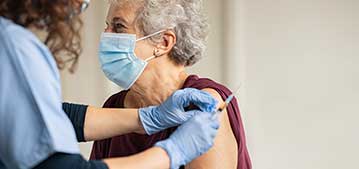COVID-19 Frequently Asked Questions
Looking to get the facts about the COVID-19 vaccines? Here’s what you need to know about the different vaccines and the benefits of getting vaccinated.
Is Bakersfield Heart Hospital (BHH) offering COVID-19 vaccine appointments for the primary vaccine series (first and second dose) or booster shots?
Why should I get the COVID-19 vaccine?
If I have recovered from COVID-19, should I get the COVID-19 vaccine?
Yes. You should get the COVID-19 vaccine if you’ve had the virus. We do not currently have enough information to determine if, or for how long, someone is protected after infection (through natural immunity) from getting COVID-19 again. The vaccine is much more effective at preventing COVID-19 infection.
Please note that if you’ve had COVID-19 monoclonal antibody therapy or COVID-19 convalescent plasma, you should not receive the COVID-19 vaccine until at least 90 days following treatment.
If I am pregnant, breastfeeding or considering becoming pregnant, can I take the COVID-19 vaccine?
If I am sick, how can I get monoclonal antibody therapy at BHH?
Patients need to be evaluated by a medical provider to determine if they are a candidate for monoclonal antibody therapy. If the provider recommends the treatment, they can instruct you on where to receive the therapy.
Will I need to get a booster shot if I’ve already had the full course of the COVID-19 vaccine?
How many doses of the COVID-19 vaccine are required?
The Pfizer vaccine requires two doses, administered 21 days apart.
The Moderna vaccine requires two doses, administered 28 days apart.
The Johnson & Johnson/Janssen vaccine is one dose.
After my first vaccine, can I get a second vaccine from a different manufacturer?
No. You should complete the series of vaccines with the same product.
What’s the difference between the Pfizer-BioNTech, Moderna and Johnson and Jonson’s Jansson COVID-19 vaccines?
- are safe,
- are effective, and
- reduce your risk of severe illness
To see the specific differences between the vaccines, go here.
If I wear a mask and social distance, do I still need the COVID-19 vaccine?
Will I need to continue wearing a mask and practicing social distancing after getting the vaccine?
Yes. No vaccine is 100 percent effective, and the CDC recommends that everyone continues using all the tools available to us to help stop this pandemic, such as covering your mouth and nose with a mask, washing hands often, staying at least six feet away from others, following CDC travel guidance, following quarantine guidance after an exposure to someone with COVID-19, and following any applicable workplace or school guidance. Together, COVID-19 vaccination and following CDC’s recommendations on how to protect yourself and others, offers the best protection from getting and spreading COVID-19.
Can I get the COVID-19 vaccine if I’m not feeling well?
How long will my COVID-19 immunity last after vaccination?
Does the COVID-19 vaccine cause any side effects?
- Swelling or redness where the vaccine was administered
- Muscle and joint achiness elsewhere
- Low-grade fever
- Chills
- Fatigue
- Headache
These side effects are expected and not serious. They will resolve with time. If you are experiencing symptoms more serious than those described, or fever continues for more than two days, contact your doctor or seek care at the nearest emergency department. Make sure you notify the vaccine administrator of these symptoms prior to your second vaccine shot.



